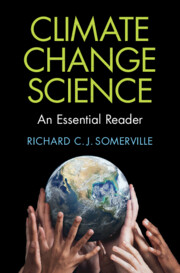Book contents
- Climate Change Science
- Reviews
- Climate Change Science
- Copyright page
- Dedication
- Epigraph
- Contents
- Preface
- Acknowledgments
- Part I Eight Articles from the Bulletin of the Atomic Scientists
- 1 Reflections on the UN Climate Change Negotiations in Bali
- 2 The Passing of a Climate Prodigy
- 3 Climate Change, Irreversibility, and Urgency
- 4 Climate Change and the 2016 Election
- 5 How to Deal with Climate Change Denying Uncle Pete
- 6 Wildfires and Climate Change
- 7 Facts and Opinions about Climate Change
- 8 Weaning a House and the World from Fossil Fuels
- Part II Understanding and Communicating Climate Change Science
- Part III Scientific Investigations of the Climate System
- Part IV The Future
- Appendix: Curriculum Vitae of Richard C. J. Somerville
- Glossary
- Resources: Recommended Websites and Books
- References
- Index
5 - How to Deal with Climate Change Denying Uncle Pete
from Part I - Eight Articles from the Bulletin of the Atomic Scientists
Published online by Cambridge University Press: 13 November 2025
- Climate Change Science
- Reviews
- Climate Change Science
- Copyright page
- Dedication
- Epigraph
- Contents
- Preface
- Acknowledgments
- Part I Eight Articles from the Bulletin of the Atomic Scientists
- 1 Reflections on the UN Climate Change Negotiations in Bali
- 2 The Passing of a Climate Prodigy
- 3 Climate Change, Irreversibility, and Urgency
- 4 Climate Change and the 2016 Election
- 5 How to Deal with Climate Change Denying Uncle Pete
- 6 Wildfires and Climate Change
- 7 Facts and Opinions about Climate Change
- 8 Weaning a House and the World from Fossil Fuels
- Part II Understanding and Communicating Climate Change Science
- Part III Scientific Investigations of the Climate System
- Part IV The Future
- Appendix: Curriculum Vitae of Richard C. J. Somerville
- Glossary
- Resources: Recommended Websites and Books
- References
- Index
Summary
Many of us have an Uncle Pete, for whom the climate change issue is not a science topic at all. It is just one more way for the authority of the state to control the lives of citizens. This view has nothing to do with science, and no argument based only on science can change it. For Uncle Pete, attacking climate science and scientists is simply a disguise for what really concerns him, a government that in Pete’s view seizes power, limits freedoms, increases taxes, regulates markets, and diminishes prosperity. As a climate scientist, I can say something with very high confidence about what will happen if we do nothing, which is Pete’s preferred policy. Vast numbers of people will become environmental refugees, and we will see the destabilization of governments, especially in failed and failing states. In wealthy and powerful countries, such as the United States, governments coping with severe climate change will surely have to act forcefully, including using emergency powers, as in wartime, to preserve order and to minimize chaos and damage. Doing nothing is likely to force governments to do exactly what Uncle Pete fears most: seize power and limit freedoms.
Information
- Type
- Chapter
- Information
- Climate Change ScienceAn Essential Reader, pp. 23 - 28Publisher: Cambridge University PressPrint publication year: 2025
Accessibility standard: WCAG 2.0 A
Why this information is here
This section outlines the accessibility features of this content - including support for screen readers, full keyboard navigation and high-contrast display options. This may not be relevant for you.Accessibility Information
Content Navigation
Allows you to navigate directly to chapters, sections, or non‐text items through a linked table of contents, reducing the need for extensive scrolling.
Provides an interactive index, letting you go straight to where a term or subject appears in the text without manual searching.
Reading Order & Textual Equivalents
You will encounter all content (including footnotes, captions, etc.) in a clear, sequential flow, making it easier to follow with assistive tools like screen readers.
You get concise descriptions (for images, charts, or media clips), ensuring you do not miss crucial information when visual or audio elements are not accessible.
Structural and Technical Features
You gain clarity from ARIA (Accessible Rich Internet Applications) roles and attributes, as they help assistive technologies interpret how each part of the content functions.
